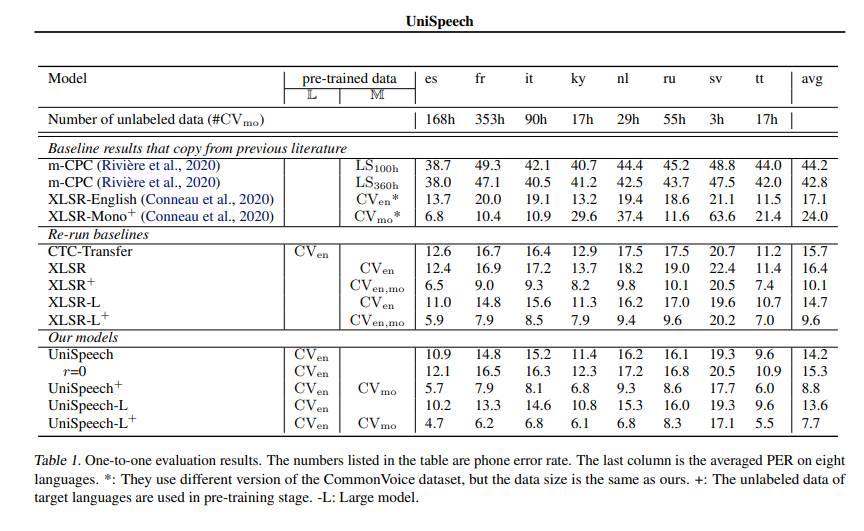🚀 UniSpeech-Large-plus Kyrgyz
This is a large model based on Microsoft's UniSpeech, pretrained on 16kHz sampled speech audio and phonetic labels, and fine - tuned on 1h of Kyrgyz phonemes. It is used for automatic speech recognition tasks.
🚀 Quick Start
This model is a speech model fine - tuned for phoneme classification. When using it, ensure that the speech input is sampled at 16kHz and the text is converted into a sequence of phonemes.
✨ Features
- Pretrained on 16kHz sampled speech audio and phonetic labels.
- Fine - tuned on 1h of Kyrgyz phonemes.
- Can be used for automatic speech recognition tasks.
📦 Installation
No specific installation steps are provided in the original document, so this section is skipped.
💻 Usage Examples
Basic Usage
import torch
from datasets import load_dataset
from transformers import AutoModelForCTC, AutoProcessor
import torchaudio.functional as F
model_id = "microsoft/unispeech-1350-en-17h-ky-ft-1h"
sample = next(iter(load_dataset("common_voice", "ky", split="test", streaming=True)))
resampled_audio = F.resample(torch.tensor(sample["audio"]["array"]), 48_000, 16_000).numpy()
model = AutoModelForCTC.from_pretrained(model_id)
processor = AutoProcessor.from_pretrained(model_id)
input_values = processor(resampled_audio, return_tensors="pt").input_values
with torch.no_grad():
logits = model(input_values).logits
prediction_ids = torch.argmax(logits, dim=-1)
transcription = processor.batch_decode(prediction_ids)
📚 Documentation
Model Information
Abstract
In this paper, we propose a unified pre - training approach called UniSpeech to learn speech representations with both unlabeled and labeled data, in which supervised phonetic CTC learning and phonetically - aware contrastive self - supervised learning are conducted in a multi - task learning manner. The resultant representations can capture information more correlated with phonetic structures and improve the generalization across languages and domains. We evaluate the effectiveness of UniSpeech for cross - lingual representation learning on public CommonVoice corpus. The results show that UniSpeech outperforms self - supervised pretraining and supervised transfer learning for speech recognition by a maximum of 13.4% and 17.8% relative phone error rate reductions respectively (averaged over all testing languages). The transferability of UniSpeech is also demonstrated on a domain - shift speech recognition task, i.e., a relative word error rate reduction of 6% against the previous approach.
Contribution
The model was contributed by cywang and patrickvonplaten.
License
The official license can be found here
Official Results
See UniSpeeech - L^{+} - ky:

🔧 Technical Details
The model is pretrained on 16kHz sampled speech audio and phonetic labels, and then fine - tuned on 1h of Kyrgyz phonemes. It uses a unified pre - training approach called UniSpeech, which combines supervised phonetic CTC learning and phonetically - aware contrastive self - supervised learning in a multi - task learning manner. This approach allows the model to capture information more correlated with phonetic structures and improve generalization across languages and domains.
📄 License
The official license can be found here

